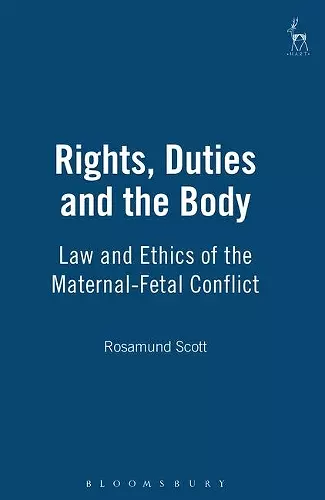Rights, Duties and the Body
Law and Ethics of the Maternal-Fetal Conflict
Format:Hardback
Publisher:Bloomsbury Publishing PLC
Published:5th Aug '02
Currently unavailable, and unfortunately no date known when it will be back

If a pregnant woman refuses medical treatment needed by the fetus - for instance for religious reasons - or conducts some aspect of her life in a way which risks fetal harm, there may arise an instance of "maternal-fetal conflict". This is an unfortunate term, since pregant women are generally renowned for their self-sacrificing behaviour, but it may well reflect the reality of certain maternal choices and actions. Should a pregnant woman have the legal right to refuse medical treatment needed by the fetus, or should she owe it a legal duty of care which precludes her acting in ways which may harm it? Does the debate hinge simply upon the appropriateness, or otherwise, of legally compelling presumed moral obligations, or is it more complex than this? Indeed, what are a pregnant woman't moral obligations towards her fetus? In England and in some US states, courts have held that a pregnant woman has the right to refuse medical treatment needed by the fetus. In similar fashion, the idea of a general maternal legal duty of care toward the fetus has been rejected, most recently in Canada. The cases, however, leave the impression of an uncomfortable split between the ethics and the law, as if the problem were entirely one of not legally enforcing presumed moral duties. The effect is both puzzling and polarising: puzzling in that the cases leave unanswered - as largely they must - the huge question of a pregnant woman's moral rights and duties; polarising in that the cases leave troubling tensions about a pregnant woman's rights in the face of fetal harm or death. The tendency is to deny these by ever more strongly asserting a woman's rights. In turn this encourages a reaction in favour of fetal rights, one which is unlikely to attend to a woman's interests and difficulties in pregnancy. This could have serious legal repercussions for various instances of maternal-fetal conflict, including in those US states or other jurisdictions which have yet to address these issues. It might also increase the pressures on the issue of abortion. This book, which seeks a way between these polarised positions, tries to explain and justify a woman's moral and legal rights in pregnancy and, at the same time, to explore...
This is an insightful exploration of a difficult issue, and will be of interest to academics in law and philosophy, lawyers, policy makers, health professionals and students of medical law and ethics. The Review Editor ChildRIGHT November 2002 Scott is to be congratulated on a book that makes a valuable and original contribution on an important subject. Her approach is thoughtful and thorough. She identifies and confronts the issues in an honest and open-minded manner. In an area that has all too often been dominated by assertions rather than arguments, Scott offers a sophisticated approach and close and careful analysis. Her book is a rich resource. John Seymour Modern Law Review January 2004
ISBN: 9781841131344
Dimensions: 234mm x 156mm x 37mm
Weight: unknown
480 pages